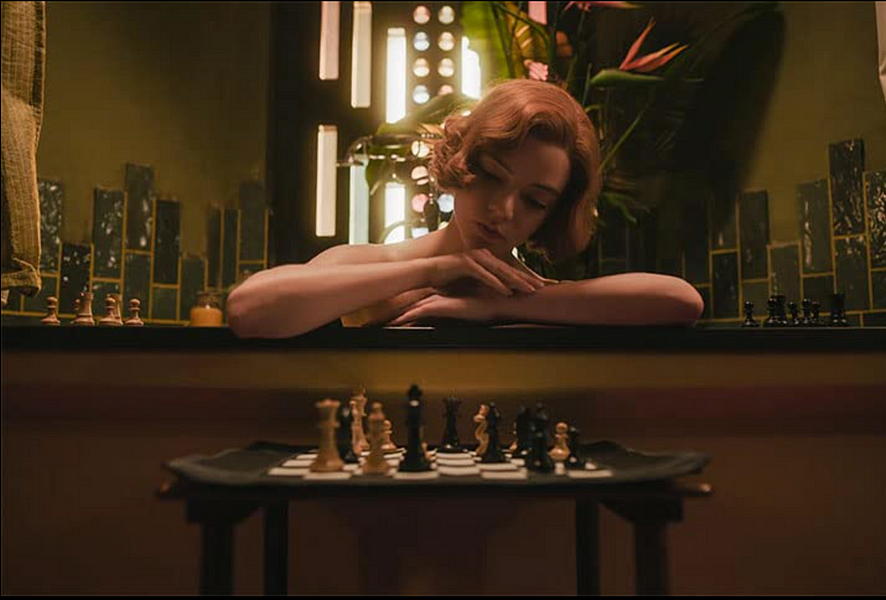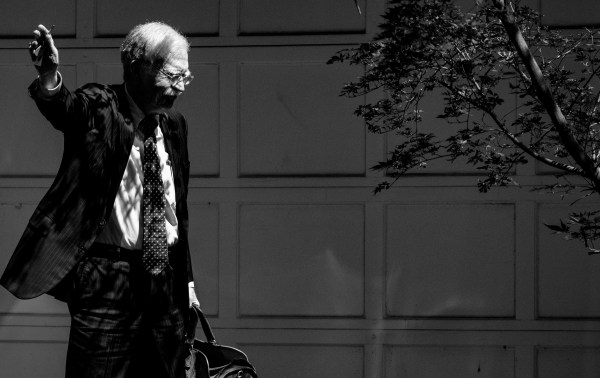Warning: This review contains spoilers about the entire series of The Queen’s Gambit.
It has been called the Royal Game. To this day, people debate whether it is an art or a sport or “just” a board game. Everyone from kings and ministers to everyday people played and play it. It has been the subject of portrayals and references in literature, poetry, TV, and movies. Charles Krauthammer famously loved it despite what he called the “scoff” of others.
But I have never encountered as beautiful an ode to chess as The Queen’s Gambit, a limited series available on Netflix that has become a binge-watching favorite during this time of lockdowns. Set in Kentucky in the 1960s, it tells the fictional story of Beth Harmon, an orphaned girl who rises up in the ranks of the chess world to become an international star and phenomenon amid tragedies and triumphs and travails of varying descriptions.
The audience may note themes in this show familiar to modern viewers—questions of feminism and religion, of the Cold War and race relations. These things are certainly present and worth discussing, but they are not the core of this show. Instead they serve as important background for a forceful argument that the game itself is something that deserves to be taken seriously—as a sport, as an object of beauty and love, and perhaps even also as a metaphor for life itself.
“Now You Resign”
Let’s start with chess as a sport. One of the first things Harmon’s first chess teacher, a janitor who plays chess in his spare time in the orphanage’s basement, teaches her is that sportsmanship is a core part of the game. It’s not just about winning; there are unwritten rules like resigning when you have clearly lost, and shaking your opponent’s hand even after they crush you.
It’s a vital lesson for her, as the world of competitive chess she enters is ruthless but full of potential.
On the one hand, this is a purely meritocratic world (at least in theory; reality for women in chess was and remains complicated). You don’t need to be accepted by a team or be in the right crowd. All you need is yourself, your skill, and the determination to win. Money is needed to get around, sure, but not nearly as much as parents spend on club sports for their kids or on golf or tennis lessons.
Sufficiently prestigious games are treated like sporting events broadcast on the radio and sometimes involving pre-game press conferences. Success in chess even leads to celebrity and press covers, the peak of this coming with Harmon mobbed by a gaggle of fans during the ultimate tournament of the show.
This is a world where people compare relative rankings no differently than football fans, where all players try to psyche each other out by slurping coffee or tapping their shoe or even just not moving at all. It’s a world where doing play-by-plays, analyzing options, and learning from mistakes is as important as winning.
And Harmon does lose. Sometimes badly. Dealing with that often takes real effort, since she can conceive of no life outside of chess (more on this below). Yet the discipline she learned allows her to channel her energy on the board, with a playing style that’s as aggressive as she is emotionally restrained. The discipline of the game channels her energy (and hidden rage).
It is also a sport containing a whole panoply of types of people—from a normally gifted but not phenomenal local Kentucky state champion like Harry Beltic to the driven Russian kid who intends to be world champion before he hits 20. Some drop out and become reporters or simply hangers-on and observers. Others, like the show’s American champion Benny Watts and world champion Vasily Borgov, are committed to playing for life.
Watts and Borgov are a fascinating study in contrasts, and seemingly reflect the two core aspects of Harmon herself.
Watts is cocksure, loves to win and even rub it in, but also has trouble containing his worst impulses (which would explain why he resides in a barely livable apartment despite his prestige). As Harmon advances professionally, she also learns to let loose—sometimes in good ways, such as her going from being socially standoffish and uninterested in what she wears to becoming a true fashion icon, but sometimes in bad ways such as drowning herself in alcohol or drugs after hitting roadblocks.
Borgov is the exact opposite. He is the consummate gentleman of the sport: always wearing suits or dress shirts, behaving impeccably, and proving to be an absolute master at masking his feelings. His face appears emotionless, but pay attention throughout the show and you’ll see that it’s restraint, not lack of sympathy or humanity. Like Harmon herself, though we don’t quite know his background, Borgov also fears for the future, wonders about how long he can keep up his game, and is possibly considering changing his life and defecting.
In all these ways, we see how chess as a sport sucks people in, fascinates and excites them, and constitutes a world in its own.
“Again”
But as we learn throughout the series, winning games and finding celebrity are not the only things that draws people to chess. There’s something else, something deeper: love.
In our post-sexual revolution age, love is almost always mentioned in the context of sexual attraction or desire. But this show is an ode to chess, and it aims to portray how people can also love something as simple as a “mere” board game.
Competition can explain the tournaments and their world. It cannot explain the rows of older people playing each other for fun in a Moscow park. It cannot explain how the characters constantly talk about the game even when making love (as Benny Watts does after sleeping with Harmon). At one point or another, several of the male characters–D.L. Townes, Benny Watts, and Harry Beltic—feel love toward Harmon, and those feelings are fueled by a shared love of the game, a shared world and language.
A scene late in the show nicely demonstrates this. Harmon is at Watts’ apartment as he brings some friends over. They’ve had fun, worked through a problem, and have had a bit to drink. The three men look at Harmon with a devilish look in their eye, something that might have hinted at a sexual pile-up in another show. Here it leads to an aggressive, almost unending series of games between Harmon and the men.
If you think it’s “just a game,” this is odd and even weird. If you understand this is about real, non-sexual love for something, it makes perfect sense.
Harmon even finds family– in the sense of people she emotionally connects with and feels tied to–in those who help her advance and enjoy the chess world. Her father is out of the picture and her mother a source of great fear for her. Her foster parents are an indifferent father and a mother who is genuinely helpful and devoted, but who does not really understand her all that well.
But the janitor who first taught her is a surrogate father, teaching her rules, encouraging her skill, and keeping news clippings of all her successes. Her former chess opponents help her in the last episode with her game not as part of a formal team such as Borgov has, but as loving and caring friends. Her friend from the orphanage, Jolene, is at first jealous of her love for chess and even hides her book, but eventually realizes that love and accepts it, rejoicing in her accomplishments.
As important as competition and love are for the game, though, there’s one element missing, the crucial driver of why Harmon plays chess in the first place: life and the control over it.
“Like Tic-Tac-Toe”
In one scene, one of Harmon’s acquaintances notes that there will come a time when computers will have such a thorough command of the game that it will be “solved,” and every result as easily calculable as “tic-tac-toe.” A pressing question in philosophical and social terms, but one that also terrifies Harmon personally.
This is because Harmon became an orphan in a particularly awful way. Harmon’s mother gave birth to her out of wedlock and was unable to persuade the father be involved. And so she deliberately drove into another vehicle with Beth in the car, attempting to “solve” the problem of their existence by ending both their lives. The mother dies, but Harmon survives—stunned but still living. Harmon’s most formative experience was thus a trauma which she was entirely helpless to prevent, an act of chaos she could not stop.
From the beginning of the show, she is desperate and insistent on maintaining that control denied her. She restrains herself from expressing even simple emotion whenever she can and despite her inner rage at her fate. She takes tranquilizers given at the orphanage, and steals them when they are denied her. There is more than one scene where she falls into a drunken or drugged out stupor, yet immediately afterward, she cleans up almost compulsively.
For her, chess is the ultimate controlled environment, a world where she alone is in charge, and if something bad happens—i.e., she loses—it’s on her and no one else. And the one thing she fears more than anything is that the path she is on is the same as the road her mother took her—with no way out. When Benny tries to comfort her after a loss to Borgov, saying maybe it was because she was drunk or high, she insists “It wouldn’t have mattered,” and that sense of an inevitable steamroller is about more than just that game.
It’s not an unreasonable fear considering some of the fates of real-world chess stars. Paul Morphy, the unofficial first world chess champion and an inspiration for Harmon, ended up impoverished and broken. Akiva Rubinstein, a chess prodigy who never made it to the top, ended up in a sanitorium in his final days. Bobby Fischer’s descent into paranoia, which occurred after the period in which this series takes place, seems a cautionary tale for geniuses coming too close to the sun or staying too long and burning out. Even success might ruin her; in a scene in which she asks a Russian kid what he’ll do with his life after he makes it to the top of the game, he doesn’t even understand the question. It might be the same for Harmon.
Throughout the show, we see Beth being offered ways out for a “normal” life. These “options” come in the form of people she knew who changed after their initial encounter—a former mean classmate who became a mother, a female chess player inspired by her success to become a doctor, the former state champion who proposes they settle down to a comfortable middle-class life in Kentucky, and a French model who implicitly offers a life of luxury without the madness. All of these seem reasonable and possible choices, but it’s a step Beth can’t take, or at least, not yet. For her, she still needs the control of chess.
But is it a path to ruination?
Toward the end of the show, this assumption is questioned though not refuted. Jolene tells Harmon that maybe her mother was uniquely disturbed, and she realizes it’s a fact that she can still play without pills and alcohol after her State Department handler accompanying her to a tournament in the Soviet Unioninsisted she dump both.
Finally, she plays against a man who has played against the best players to ever live during the final tournament. She wins, but what’s more important is how relaxed and joyful he is, complimenting her calmly and graciously as having played “the best chess” he’s ever seen and telling her she should get used to it.
This Grand Old Man of Chess represents another option, another possibility for her. Just as the game has different and nearly endless variations and possibilities, life is also not tic-tac-toe. She may end up like her mother, she may end up like him or people like Garry Kasparov and Judith Polgar, giants of the game who are as well-adjusted as any.
Which path will it be? Which variation will be hers? There’s only one way to know for sure, as certain as one can be—to keep trying, keep exploring, keep searching. This round’s over, it’s time to put the pieces back together for another go.
Let’s play.
Again.
Avi Woolf is an editor and translator. He has been published in Arc Digital, National Review, and Commentary.






Please note that we at The Dispatch hold ourselves, our work, and our commenters to a higher standard than other places on the internet. We welcome comments that foster genuine debate or discussion—including comments critical of us or our work—but responses that include ad hominem attacks on fellow Dispatch members or are intended to stoke fear and anger may be moderated.
With your membership, you only have the ability to comment on The Morning Dispatch articles. Consider upgrading to join the conversation everywhere.